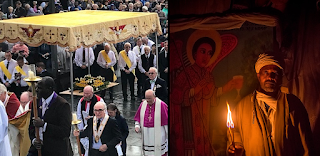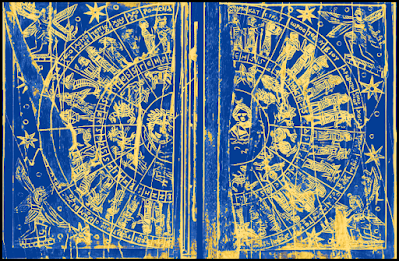'Exoteric' and 'Esoteric' defined
The terms esoteric & exoteric are often misused and misunderstood. The dictionary aside, I like to define them as follows:
Exoteric: Encapsulates the superficial or public aspects of a religion, its practices as understood by most adherents, its basic philosophical tenets, and any moral or ethical principles or restrictions associated with it. Also includes popular aspects of occultism, such as basic astrology, widely held beliefs and superstitions, &c
Esoteric: The deeper, mystical aspects of a religion or religio-magical system, often but not always kept secret (and frequently marginalized depending on the religion). These include magical/mystical practices designed to produce supernatural effects, or facilitate contact with non-physical entities; techniques that effect a transformation on the practitioner (such as meditation); a deeper understanding of the symbols or tenets of a religion that go beyond their superficial aspects, and more sensible and reasonable explanations behind principles or rituals.
My definitions here are reliant on placing religion and occultism under the same parent category, which I define as the interaction between humans and the non-physical world.
It should be noted that the line between exoteric and esoteric is occasionally blurred on a practical level, and can depend on the understanding of the operant.
A Christian liturgy can be (and usually is) performed on autopilot as a mere formality, without a deeper understanding of its true power, but the rare experienced priest, cognizant of the power of ritual, can use it as a means of communion with the Higher, with proper preparation, intonation, and a reverent/receptive state of mind to unlock its inner potency.
For the esoteric aspects of certain Catholic/Orthodox sacraments, see Dionysius the Areopagite’s Ecclesiastical Hierarchy
A Hindu puja (liturgy) can be performed by focusing merely on external ritual actions, but can also be used as a vehicle of divine systasis via tantric meditative practices, visualization and specific mantras.
The very aim of worship is viewed differently from an exoteric and esoteric lens. The average Catholic understands attending the Mass on Sundays is a duty mandated by Church tradition, traceable to the third commandment, that will endear them to God and ultimately facilitate their salvation in the afterlife; or even a mere formality passed down by their family. Whereas a mystically minded Catholic might see the rite as a means of communing with God’s presence, receiving possible higher guidance in their mundane life, transmuting their lower self into a worthy catalyst for higher forces by partaking of Christ’s consecrated body & blood, and strengthening their union to godhead here on earth, which may then translate into tangible signs in their daily life.
It should be noted that the esoteric aspects of a religion are not always present at its onset, but often develop as the understanding of the tradition becomes refined - Abrahamic religions are prime examples of this (conversely, the Greek mysteries developed fairly early). Degenerate puritanical movements that seek to purge religion of esoteric elements are therefore regressive, and lead to the very decadence they claim to oppose; the means of interaction between humans and the divine is thereby restricted or cut off, and supplanted with dogma and moralism, while rituals are diluted or eliminated outright.
We should also clarify that exoteric and esoteric aspects are not always at odds with each other; a good example is found in Jewish mysticism, where adherence to Jewish law, and esoteric practices, are viewed as two sides of the same coin. Notably, some famous qabbalists also wrote exoteric works.
Esotericism can also develop under influence from other religions. Such is the case with Gnosticism, wherein Judaism and Christianity adopted aspects of contemporary Pagan currents. Jewish mysticism itself was heavily influenced by non-Judaic elements, which were skilfully integrated into Judaism.
The best way to illustrate the division is to lay out a few specific tenets and practices, each with its exoteric and esoteric aspect (though not necessarily in the same tradition)
Dietary restrictions
Exoteric: Jews and Muslims avoid certain foods, such as pork, for they are considered unclean and their willful consumption will attract God’s disfavour; Catholics avoid meat on Good Friday to commemorate Jesus’ crucifixion as a mark of respect; many Hindus avoid eating beef, as cows are considered a divine symbol of motherhood; Jains practice vegetarianism as a token of respect for all living beings, since their religion is founded on peace and non-violence.
Esoteric: In the Hermetic Sacred Book of Hermes, dietary restrictions are prescribed as a means of better drawing down the influence of the 36 Decans for healing (avoiding foods that are unsympathetic to the Decan); as for vegetarianism it overall has a better effect on the body, which will ultimately translate into ritual efficacy.
Circumambulation
Exoteric: Muslims circumambulate the Ka‘ba seven times (tawaf) as a symbol of religious unity between worshippers.
Esoteric: According to the 10th century Nabatean Agriculture (referencing Middle eastern/Sabaean practices), circumambulating a sacred image allows the individual to draw to themselves the favourable influence of the force behind it, and creates energetic reciprocity between the worshipper and the object:
“They say that if one circumambulates the idol of the Moon seven times, this will draw him close to the Moon and the Moon will be so pleased with him that it will take the place of the great offering…When someone, or a group of people, circumambulate something, the thing which is circumambulated, will receive a subtle special property which comes to be through (the action of) people and that thing will be full of blessing towards people and there will be in their hearts a fear and reverence and respect towards that thing.”
A similar effect is posited in Hinduism, wherein sacred images are sometimes circumambulated.
Fasting
Exoteric: Christians fast on certain occasions as a form of self denial, purification & penance; Muslims fast during Ramadan for self-discipline and as a means of fostering compassion for the needy.
Esoteric: Fasting induces light headedness, and enables us to become better attuned to non-physical forces, improves clairvoyance, &c.
Prayer
Exoteric: Prayer is variously seen as a religious duty or formality, a means of giving our troubles over to God and feel better
Esoteric: Prayer, especially when combined with ritual actions, allows us to draw down the power of a deity or deities and tangibly manifest their influence. Prayer also has a positive, transformative effect on the person praying, and brings the individual closer and closer to the deity. To quote Iamblichus:
"Extended practice of prayer nurtures our intellect, enlarges very greatly our soul's receptivity to the Gods, reveals to men the life of the Gods, accustoms their eyes to the brightness of the divine light, and gradually brings to perfection the capacity of our faculties for contact with the Gods, until it leads us up to the highest level of consciousness (of which we are capable); also, it elevates gently the disposition of our minds, and communicates to us those of the Gods, stimulates persuasion and communion and indissoluble friendship, augments divine love, kindles the divine element in the soul, scours away all contrary tendencies within it, casts out from the aetherial and luminous vehicle surrounding the soul everything that tends to generation, brings to perfection good hope and faith concerning the light; and, in a word, it renders those who employ prayers, if we may so express it, the familiar consorts of the Gods." (De Mysteriis V. 26)
Faith
Exoteric: Faith is a divinely ordained virtue that must be cultivated in order to remain on good terms with God, especially in Abrahamic religions.
Esoteric: Faith and belief can be used as a means to an end, as our mind state during ritual produces better results; I.e. having faith that a magical operation will yield results increases the chances of such manifesting
Processions
Exoteric: In Catholicism and Orthodoxy, public processions primarily serve a celebratory or commemorative purpose for a specific holy day or sacred occasion.
Esoteric: Catholicism has a few extraordinary processions designed to beseech God’s aid, notably to bring rain during drought, during times of famine and war, &c.
Abrahamic scriptures (Bible and Qur'an)
Exoteric: Books like the Bible and the Qur'an are sacred texts to be used for guidance and instruction in the faith, and considered the revealed word of God
Esoteric: Both the Bible and Qur'an are used magically. Practical Qabbalists derived magical names from relevant biblical verses by Notariqon, and used them for practical ends. Biblical verses are also used in Christian magic and Hoodoo, and Qur'anic verses are widely used in Sufi magic
Sexual rules
Exoteric: Especially in Abrahamic faiths, sexuality is a source of sin, immorality and impurity, and should only be confined to the context of heterosexual marriage for reproduction. Sexual abstinence is considered virtuous in the sight of God.
Esoteric: Sexual activity has a draining effect that is detrimental, and makes it difficult to connect with the higher. Hence the recommendation to practice abstinence for a period of time before magical operations in many texts. Conversely in tantric traditions, sexual practices can be used to good effect.
Morality and virtue
I will quote Israel Regardie (in The One Year Manual) here:
"We cannot make a vital contact with our Angel by goodness or obedience — these latter characteristics merely follow when we have found Him . Then goodness and obedience and the other so called virtues take on another meaning altogether, far removed from that understood in the bourgeois or conventional morality."
___________________________________________________________________________________
The above are just a few examples. By enumerating these aspects, I don’t mean to disparage exotericism (as it can sometimes be used as a beacon to lead people deeper), but to clearly define the two for anyone who may still find them confusing.







Comments
Post a Comment